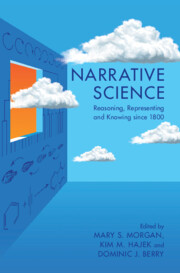Narrative Science
Narrative Science examines the use of narrative in scientific research over the last two centuries. It brings together an international group of scholars who have engaged in intense collaboration to find and develop crucial cases of narrative in science. Motivated and coordinated by the Narrative Science Project, funded by the European Research Council, this volume offers integrated and insightful essays examining cases that run the gamut from geology to psychology, chemistry, physics, botany, mathematics, epidemiology and biological engineering. Taking in shipwrecks, human evolution, military intelligence and mass extinctions, this landmark study revises our understanding of what science is, and the roles of narrative in scientists’ work. This title is also available as Open Access.
Mary S. Morgan is the Albert O. Hirschman Professor of History and Philosophy of Economics at the London School of Economics.
Kim M. Hajek is a postdoctoral researcher associated with the Narrative Science Project, who currently works on the ‘Scholarly Vices Project’ at the University of Leiden.
Dominic J. Berry is Research Fellow on the Narrative Science Project, and the ‘Everyday Cyborgs 2.0’ project at the University of Birmingham.

